- Home
- Stephen Hunter
Havana es-3 Page 16
Havana es-3 Read online
Page 16
"Three hundred sixty-two, in a flash. Bang, all gone, just like that."
"I get the point," said Earl. He glanced at his watch. "We have to be going. I have a flight."
"One more stop, Earl," said Roger. "No lectures, no chatter, no rah-rah from men you must think of as boys who haven't done one-tenth as much as you. But one more stop. It's just a bit of a way."
Roger signaled and the car came and got them, and Earl lumbered into the backseat with his hip throbbing away and now his head and shoulder also racked from the funny tension of walking with the damned cane.
"You let them give you anything for the pain?" asked Frenchy.
"I'm taking aspirin. I didn't want nothing stronger. You get used to feeling too happy. This ain't bad. Been through worse."
"I'll bet. The stories you could tell," said Roger.
"I don't tell stories, Mr. Evans."
"I know, Earl. It was just a figure of speech."
The car drove through Havana's busy traffic, where the cars all seemed to date from the thirties. The men wore straw boaters and linen suits and the women high heels and bare shoulders. Spanish in its most riotous form filled the air, and the sun slanted through palms and dust and beeps and squawks. Kids sold lottery numbers on the street, bananas, coffee, carvings and their sisters.
But then the car passed through gates, under the dark glade of well-nurtured and — tended trees, and up to a house that had once been a palace or at least a mansion. Earl saw the brass plaque next to the mahogany doors, and knew what he was in for.
They went up steps and of course the place was deserted. It was not a tourist hangout nor of much interest to the Cubans themselves. It spoke only of a kind of national vanity and the nation in question wasn't Cuba.
MUSEUM OF THE SPANISH-AMERICAN WAR
They entered to church-like silence, and the presence of ghosts. Behind glass, manlike forms without faces stood in khaki uniforms, with hats upturned jauntily, speaking of vigor and mission and courage. They wore gold piping and puttees and carried bigflapped cavalry holsters crosswise on huge belts that were marked with cartridge loops.
Earl walked, with the aid of his cane, down the aisles, to more displays: medals, maps, a papier-mache model of a hill outside Santiago, with forces identified by tiny flags and color-coded: blue for American, red for Spanish. Cooking utensils, newspaper front pages, pocketknives, compasses, all un-dusty, under glass, which was dusty.
"See, Earl? There are other islands where Americans died. Iwo, Saipan, Guadalcanal, Tarawa, terrible islands. But there were other islands."
Saddles, well-worn and burnished, and other horse gear appropriate to a cavalry unit at the turn of the century. Boots and saddles. A beat-up old bugle. Quirts and whips. Spurs, jingly-jangly tack, saddlebags, rifle scabbards, all preserved under the dusty glass in the darkness, untouched for years.
"Here, Earl. This one should interest you."
The guns. Colt revolvers, single-action armies, six-shooters, Peacemakers, whatever you wanted to call them. They were familiar to him because his father had buckled one on every single day of his life, and Earl's job had been to clean it. He knew the old man was good with it, because in 1923 he'd shot it out in a Blue Eye bank with three wild brothers, and killed them all, and been a hero. Earl couldn't remember clearly, possibly because he didn't want to.
The guns were beautiful orchestrations of balance and harmony, of circles and curves, of the precise melding of steel and wood in the brilliance of design.
"Ever shoot one of these old Colts, Earl?"
"Of course I have," said Earl.
At least twenty-five of the guns that the Rough Riders had carried up San Juan were displayed in the case, most with long, elegant barrels, the 71/2-inch models that Teddy Roosevelt himself carried. But there were a few others brought in by western lawmen who'd joined the Rough Riders in San Antonio, men who preferred the shorter length of the 45/8 for its quickness in maneuver and deadliness at short range. They were gunfighters, the men who carried those guns, not soldiers.
And ammo. What museum would be complete without the old boxes with their quaint nineteenth-century printing, the cardboard now delicate, the boxes slightly distended for their loads of cartridges inside, huge as robin's eggs, weirdly dense, weirdly serious.
And holsters, too. Of course. Those big flapped things for the cavalry, with the leather over top securing the revolver against the jostle of the animal beneath. But that was not all. Being gunfighters, many of the Rough Riders had their own private rigs, shoulder holsters many of them, to tuck the shorter-barreled Colts away from prying eyes. Earl saw several of fine leather, basketweave-stamped, complex nests of strap and stay and loop and buckle, built to hold the gun just so out of sight that a dexterous man could get it into play in less than a second.
"Okay," said Earl. "I see what you're up to."
"Earl," said Roger, "I just want you to know that men came here, American men, with guns, and fought and died and bled to make this island into something. They were young men, they probably didn't want to die, but they did. And I'm not even going to take you into the disease room, the yellow fever room, and that particular horror. We'll stay here, where we don't have to think about all that dying."
"This ain't right," Earl said. "You are fixing it so that if I say no to you, I'm supposed to be saying no to the men that carried these guns and died on this island. But you ain't them. They are them, and you and Frenchy are something entirely different."
"That is true," said Roger, "and I know you don't care for us and would never see us as their inheritors. You're their inheritor; we're merely little bureaucrats to whom fate has given a responsibility that we hope to hell we can live up to. Well, maybe we can't. I know we can't without your help, Earl."
"Time to stop horseshitting around. This ain't a place for doubletalk. You tell me straight out what you want."
"The island is in play. You've almost gotten killed twice on account of it. Someone sees a destiny for it that isn't free and isn't American. That destiny will grow and grow and maybe sometime down the pike, more American boys with guns will have to land on this island to take it back. You know how many times bigger Cuba is than Iwo Jima?"
"A hell of a lot bigger."
Now Frenchy spoke.
"We have a lot invested in this place. A lot of men died here. It's our blood in the soil as much as anybody's. So we have a moral right to protect it. Now there's a force on the island that means to steal that away and make it something different and foreign. Suppose now, while it's early, we could stop it. Stop it with the big noise of a single shot. Would you have fired a shot in 1938 to kill Hitler? Or in 1940 to stop Tojo?"
"It's always this way, ain't it," Earl said. "Some college kids dream up something and convince themselves it's so right. Then some poor jerk with a gun has to make it happen."
"It is always that way, Earl," said Roger. "That is it entirely. But as annoying as you find us, Earl, you have to admit that we are right."
"You bastards," said Earl, knowing that he had no choice but to sign on, for better or worse.
"It's your call, Earl. We can still make the plane."
"You bastards. Take me to the goddamned hotel. I have to call my wife and make her cry again."
Chapter 27
"You see," explained Ramon Latavistada, "it's not a question of stuff. I can get stuff. I can get any stuff. This is a talent of mine. Excuse, please."
With that he turned and inserted the tip of a scalpel into the eyelid of a prisoner named Hector. Hector was chained to a wall in the bowels of the Military Intelligence Service's Havana location, which was the Morro Fortress. He had been picked up on the recommendation of the political section as a well-known agitator, subversive, pamphleteer, speechmaker and confederate of "Greaseball," as Fidel Castro was known to the SIM.
But Ramon did not plunge the blade into the eye, thereby blinding Hector. What would that have proven? Nothing. Merely that blades cut, blood flow
s, eyes are vulnerable to violence and the result is exceedingly messy and painful.
Instead, with a deft flick of his wrist, he incised just deep enough into the eyelid to open a small cut that would nevertheless bleed profusely. Since Hector's eyelid was taped open, he could not blink; the blood would flood his eye, and he would have the sensation of drowning in a pool of his own blood, while at the same time facing, by implication, a forever of blindness.
He commented, in Spanish, " Aieeeeeeeeeeee!!!!"
"Hush, hush, my friend," said Ramon.
"You can get stuff," said Frankie, oblivious to the scene. "And by stuff, I suppose you mean contraband. I'm thinking narcotics."
"Yes, of any sort."
"In quantity."
"I have my suppliers, yes."
"The problem then is distribution."
"Well, I would think those concerns would be handled on the other end. My more immediate concern would be importation, protection, intelligence, political allies, essentially the whole apparatus. It takes a skilled operator to set up such an organization. This, my friend, is where I thought you and I could have some conversations."
" Aieeeeeeeeee!! Please! Please, no more, sir!"
"Hush," said the captain. "We are not ready for you yet."
"My eyes! O my god, my eyes!"
"Yes," said the captain in Spanish, "your eyes. Anyhow," he returned to his extremely fluent English, "Senor Carbine, I seem not to get very far with the old men who run your business in America. They have their allies, their connections, their situations all set up. They seem committed to certain groups in Mexico. I suppose the temptation of that long border, so hard to patrol. But if only someone would see: my way is so much better."
"You could move in quantity?"
"Of course. In time, though. All things in time. It would first be necessary to move small test shipments, to make certain the apparatus was adequate. But even in that small step, you see the genius of this business. The product, shipped in pounds, can then be stepped on and turned into hundreds of pounds. From so little, so much. The profits are astonishing. Once people are exposed, they cannot say no. Another thing: when the women are hooked, they will do anything to satisfy their need. Anything. Do you understand what I am saying? I am talking of beautiful women, too. It is amazing, truly."
He turned back to Hector, reinserted the tip of the blade, and administered the next tiny little flick. The results were as desired and designed. Hector jacked in pain and terror. He had a bowel movement. His muscles stood out like ropes against his arms. He bucked and twisted, beyond degradation.
"Ugh," Frankie said, "do they always shit like that? Man, he dumped a ton."
"It's hard to predict. Some do, some don't; you never can tell. All will talk, though. No one can stand the idea of the eye being sliced away, the pain, the humiliation, the infirmity. It always works. It always works, doesn't it, my friend Hector?"
"Please, sir. Please, please, no more, I beg you. I'll tell you anything."
"I know that, Hector. But I am not ready for you yet. Contemplate the darkness and the pain more rigorously, if you please. Then I may blind you anyway, simply as punishment for your evil ways. That is, even after you spill the beans."
He raised the scalpel and Hector, seeing it through the eye not awash in blood, began to cry grotesquely.
"See," the captain said to Frankie in English. "The power of it. Really, it's amazing."
"Huh? Oh, yeah, yeah, that. Yeah, that's swell. Anyway, this hold on the beautiful girls? See, there's a big deal coming to America. It would be dirty pictures but in color. High quality, great lithography, glossy pages. And not just the melons. You know, all of it, the plumbing, the tunnels, the bush, all that stuff. Maybe eventually the fuck itself. If we could show it, man, the moolah would just roll in. We would have something there, let me tell you."
"Ah," said Captain Latavistada, "yes. Yes, that is very good. I like that. I had not thought of it. But, yes, the drugs, the girls in the brothels, some young and quite lovely, yes, I can see. Yes, there is potential there, too."
"Good," said Frankie. "See, I see a two-pronged thing but only one organization. That's the thing of it. By the same methods that you import, protect and distribute the drugs, you could do the same with the pictures."
"Yes, that's true. However, the drugs can be destroyed very quickly in a raid, while the pictures, being bulkier, would prove problematic. That's why initially the drugs seem a safer enterprise."
"We could solve the destruction problem with the pictures, then we'd be in good shape. I'm thinking, well, I'm no expert or nothing, but acid. Some kind of acid. Much faster and more complete than fire. I saw a guy once get a faceful of sulfuric. Man, not even Hector there would change places with that guy. Let me tell you, acid works fast."
"Hmmm," said Latavistada. "You may have something there." He looked at his watch. "Mother of god," he said, "how late. I have a meeting with a very beautiful young lady. You would excuse me, Senor Carbine."
"Frankie. You have to call me Frankie."
"Frankie, then."
"But what about―"
"Oh, that. Yes, of course."
He turned, and very quickly sliced through the eyeball of Hector, blinding him forever.
"Hector," he whispered, "tell me what I want to know."
Hector muttered something desperately through tears and snot and tremors and gasps for breath.
Latavistada nodded gravely.
"He says this Castro can be found generally at one of three coffeehouses in the afternoon, and he will give my man Eduardo the addresses of all his known supporters. Tomorrow we may intercept this Castro in any of a dozen places. It's not to be any kind of problem, my friend."
"You work very professionally."
"I mean to impress upon you that Cubans are precise and motivated and capable, not lazy, sombrero-wearing peons like the Mexicans. It's our truer, richer, purer Spanish blood. Now, as I say, I must go. I have a date at the country club."
Chapter 28
It was a quiet night at the little bar called La Bodeguita del Medio. The first wave of johns had gone off with the first wave of marias, the gamblers hadn't won or lost enough to come to celebrate or drink themselves into oblivion, no marine regiments or naval crews were on liberty, and so Earl sat alone, under a slowly spinning fan that looked like the prop on a Wildcat, and contemplated the bottle.
It lured him.
It beckoned him.
He didn't want to give in.
It sat before him on the bar, in the darkness, glinting magically, promising so much.
Fuck it, he said, and gave in.
He swallowed half with one swig, sucking greedily.
"Doesn't it go down better with something to drink?" asked someone next to him.
Earl set the aspirin bottle down before him, took a long swallow on a concoction he called a ginless-and-tonic and washed the dry, scratchy feel of the tablets from his throat.
"Yes," he said. "It does."
"How's the wound?"
"It hurts like hell."
"Why don't you take something stronger?"
"Boy, do I want to. But if I do, three weeks later I wake up in Shanghai with a Chinese wife, seven kids, four sets of grandparents and six new tattoos."
"Ah," said the man, "you are such a creature of discipline-the secret, I suppose, of your many excellent accomplishments."
Earl didn't have to look, but he did anyway. The man was still thin and papery, with dry skin, sharp, hard, bright eyes, a gray crewcut, dressed in a baggy suit.
"The last time I saw you, you was selling vacuum cleaners. What was the name then?"
"Actually, I've forgotten. I sometimes grow hazy on details."
"I think it was Wormer or Wormhold or Wormgeld."
"That sounds like something I'd come up with."
"Vurmoldt. Yeah, Acme Vacuums or some such. Maybe Ajax. Of Nebraska."
"I wonder where I got the Nebraska from? T
here can't be any vacuum cleaner companies in Nebraska, can there?"
"Wouldn't know."
"You're certain you're not drinking anything with alcohol in it? I rather enjoy the blur at the end of a busy day of selling vacuum cleaners. I'd be pleased to buy you one."
"I'd be pleased to accept one from you tonight and damned tomorrow. That's how it is. Sorry, but I do appreciate the offer. Anyhow, I should buy you one. I think I owe you one."
"Very well. I will have a mojito. This place is famous for its mojitos. Movie stars come here for the mojitos."
Earl got out a wad of bills, hailed the bartender and ordered another ginless-and-tonic for himself and a mojito for the gent on the next stool.
The two men watched the ritual as the waiter crushed sugar and rum and mint sprigs together, added lots of rum, a little spritz water, a few ice cubes, and, to top it off, still more rum, puncturing it with a straw. Then he added a little American flag on a toothpick before handing it over.
"Why, how patriotic," the vacuum salesman said. "Here's to the U.S. of A.!" and he took a nice long draught through the straw.
"I do like a man who enjoys his drinking," said Earl. "You know what, I am glad I ran into you. Here, take a look at this."
Earl reached into his pocket and came out with a brass casing less than an inch long. He set it on the tile of the bar.
"Now what do you suppose that little thing is?" he asked.
"Why, could it be from a gun?"
"You know, I believe it is."
"Guns are very dangerous, you know."
"So I've heard. Anyhow, it took some digging, but I finally figured out this came from a Soviet PPsH 41 tommy gun. It's in 7.63mm."
"A commie tommy! How alarming!"
"Yep. The commiest tommy there is. Anyhow, the other day I was busy getting killed. Seems some feller didn't like me and he was about to part my hair with an automatic. Suddenly he goes all swiss-cheesy. Someone stitched him six times with that commie tommy. Then, before he could fall, he stitched him six times again."
"Ah! Well, one can hardly miss with those guns, I'd imagine."

 Point of Impact
Point of Impact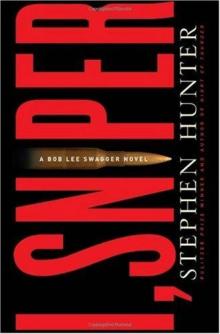 I, Sniper
I, Sniper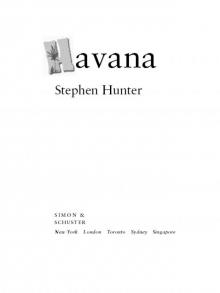 Havana
Havana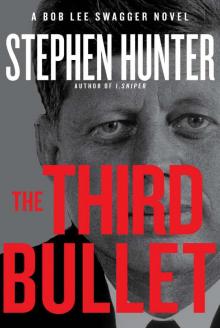 The Third Bullet
The Third Bullet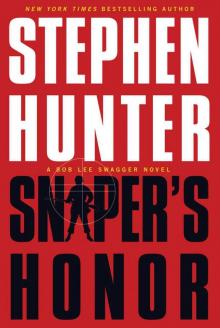 Sniper's Honor: A Bob Lee Swagger Novel
Sniper's Honor: A Bob Lee Swagger Novel Dirty White Boys
Dirty White Boys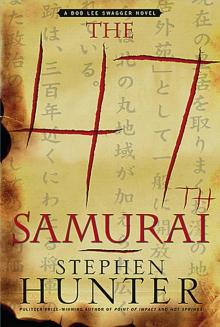 The 47th Samurai
The 47th Samurai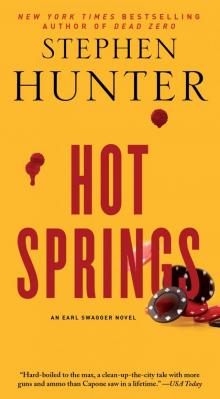 Hot Springs
Hot Springs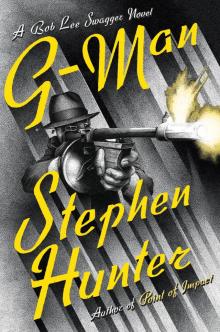 G-Man
G-Man Black Light
Black Light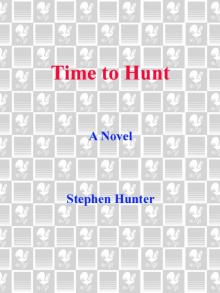 Time to Hunt
Time to Hunt The Day Before Midnight
The Day Before Midnight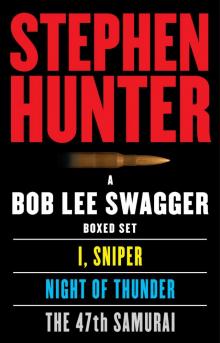 A Bob Lee Swagger Boxed Set
A Bob Lee Swagger Boxed Set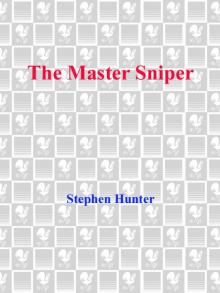 The Master Sniper
The Master Sniper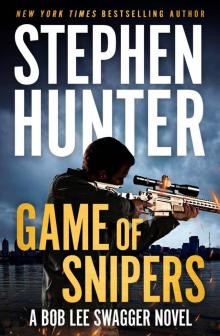 Game of Snipers
Game of Snipers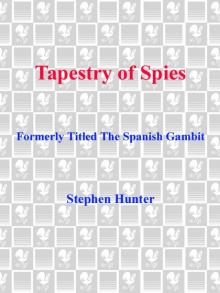 Tapestry of Spies
Tapestry of Spies Citadel
Citadel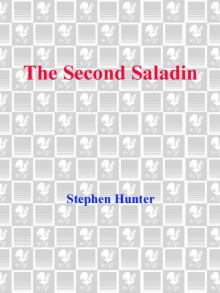 The Second Saladin
The Second Saladin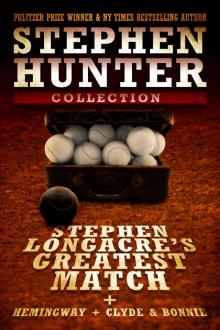 Stephen Longacre's Greatest Match
Stephen Longacre's Greatest Match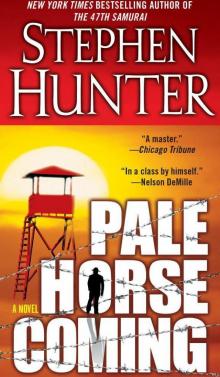 Pale Horse Coming
Pale Horse Coming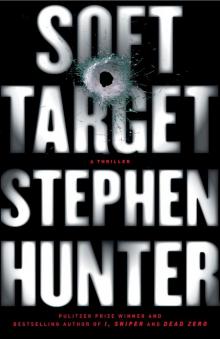 Soft Target
Soft Target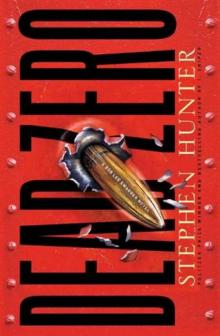 Dead Zero
Dead Zero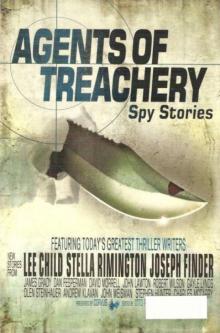 Casey at the Bat
Casey at the Bat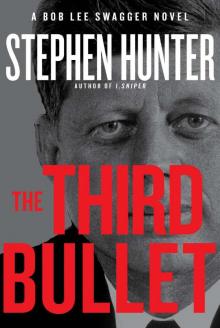 The Third Bullet bls-8
The Third Bullet bls-8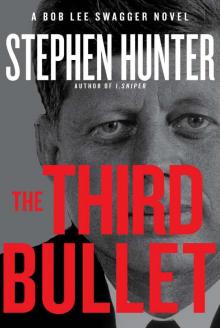 The Third Bullet: A Bob Lee Swagger Novel
The Third Bullet: A Bob Lee Swagger Novel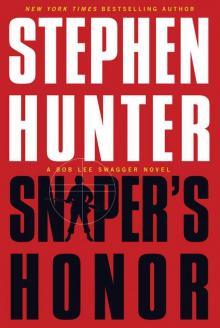 Sniper's Honor
Sniper's Honor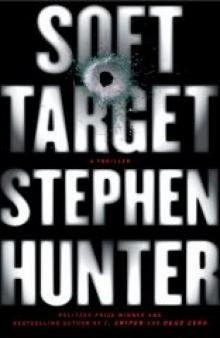 Soft target rc-1
Soft target rc-1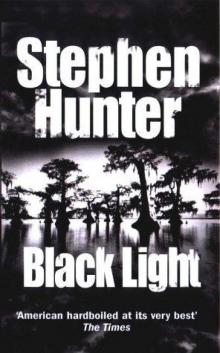 Black Light bls-2
Black Light bls-2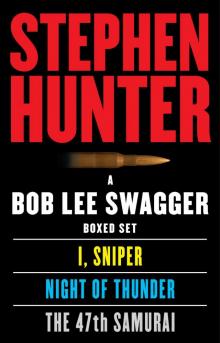 A Bob Lee Swagger eBook Boxed Set: I, Sniper, Night of Thunder, 47th Samurai
A Bob Lee Swagger eBook Boxed Set: I, Sniper, Night of Thunder, 47th Samurai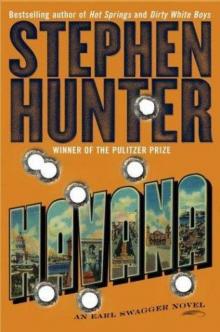 Havana es-3
Havana es-3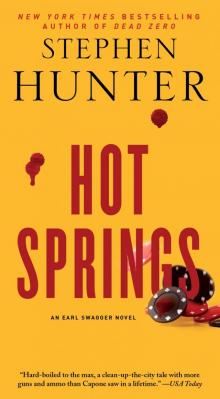 Hot Springs (Earl Swagger)
Hot Springs (Earl Swagger)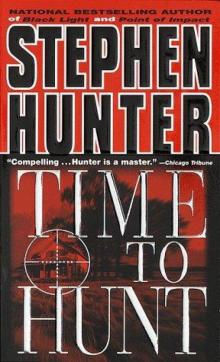 Time to Hunt bls-1
Time to Hunt bls-1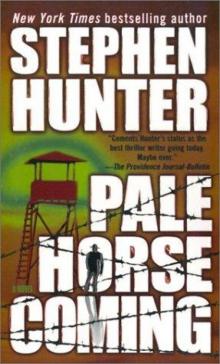 Pale Horse Coming es-2
Pale Horse Coming es-2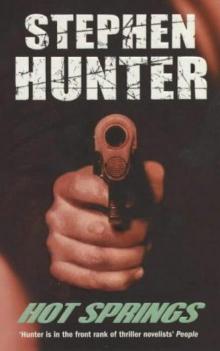 Hot Springs es-1
Hot Springs es-1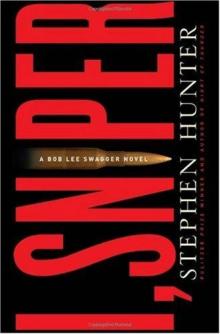 I, Sniper: A Bob Lee Swagger Novel
I, Sniper: A Bob Lee Swagger Novel